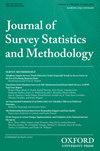Preferred Reporting Items for Complex Sample Survey Analysis (PRICSSA)
IF 1.6
4区 数学
Q2 SOCIAL SCIENCES, MATHEMATICAL METHODS
引用次数: 2
Abstract
Methodological issues pertaining to transparency and analytic error have been widely documented for publications featuring analysis of complex sample survey data. The availability of numerous public use datasets to researchers without adequate training in using these data likely contributes to these problems. In an effort to introduce standards for reporting analyses of survey data and promote replication, we propose the Preferred Reporting Items for Complex Sample Survey Analysis (PRICSSA), an itemized checklist to guide researchers publishing analyses using complex sample survey data. PRICSSA is modeled after other checklists (e.g., PRISMA, CONSORT) that have been widely adopted for other research designs. The PRICSSA items include a variety of survey characteristics, such as data collection dates, mode(s), response rate, and sample selection process. In addition, essential analytic information—such as sample sizes for all estimates, missing data rates and imputation methods (if applicable), disclosing if any data were deleted, specifying what survey weight and sample design variables were used along with method of variance estimation, and reporting design-adjusted standard errors/confidence intervals for all estimates—are also included. PRICSSA also recommends that authors make all corresponding software code available. Widespread adoption of PRICSSA will help improve the quality of secondary analyses of complex sample survey data through transparency and promote scientific rigor and reproducibility.复杂抽样调查分析(PRICSSA)首选报告项目
与透明度和分析误差有关的方法论问题已被广泛记录在以分析复杂抽样调查数据为特色的出版物中。研究人员在使用这些数据方面没有经过充分培训,就可以获得大量的公共使用数据集,这可能是造成这些问题的原因。为了引入调查数据报告分析的标准并促进复制,我们提出了复杂样本调查分析的首选报告项目(PRICSSA),这是一个逐项检查表,用于指导研究人员使用复杂样本调查数据发布分析。PRICSSA是以其他研究设计中广泛采用的其他检查表(如PRISMA、CONSORT)为模型的。PRICSSA项目包括各种调查特征,如数据收集日期、模式、响应率和样本选择过程。此外,还包括基本的分析信息,如所有估计的样本量、缺失数据率和插补方法(如适用)、披露是否删除了任何数据、指定使用了什么调查权重和样本设计变量以及方差估计方法,以及报告所有估计的经设计调整的标准误差/置信区间。PRICSSA还建议作者提供所有相应的软件代码。PRICSSA的广泛采用将有助于通过透明度提高复杂样本调查数据的二次分析质量,并促进科学的严谨性和再现性。
本文章由计算机程序翻译,如有差异,请以英文原文为准。
求助全文
约1分钟内获得全文
求助全文
来源期刊
CiteScore
4.30
自引率
9.50%
发文量
40
期刊介绍:
The Journal of Survey Statistics and Methodology, sponsored by AAPOR and the American Statistical Association, began publishing in 2013. Its objective is to publish cutting edge scholarly articles on statistical and methodological issues for sample surveys, censuses, administrative record systems, and other related data. It aims to be the flagship journal for research on survey statistics and methodology. Topics of interest include survey sample design, statistical inference, nonresponse, measurement error, the effects of modes of data collection, paradata and responsive survey design, combining data from multiple sources, record linkage, disclosure limitation, and other issues in survey statistics and methodology. The journal publishes both theoretical and applied papers, provided the theory is motivated by an important applied problem and the applied papers report on research that contributes generalizable knowledge to the field. Review papers are also welcomed. Papers on a broad range of surveys are encouraged, including (but not limited to) surveys concerning business, economics, marketing research, social science, environment, epidemiology, biostatistics and official statistics. The journal has three sections. The Survey Statistics section presents papers on innovative sampling procedures, imputation, weighting, measures of uncertainty, small area inference, new methods of analysis, and other statistical issues related to surveys. The Survey Methodology section presents papers that focus on methodological research, including methodological experiments, methods of data collection and use of paradata. The Applications section contains papers involving innovative applications of methods and providing practical contributions and guidance, and/or significant new findings.

 求助内容:
求助内容: 应助结果提醒方式:
应助结果提醒方式:


